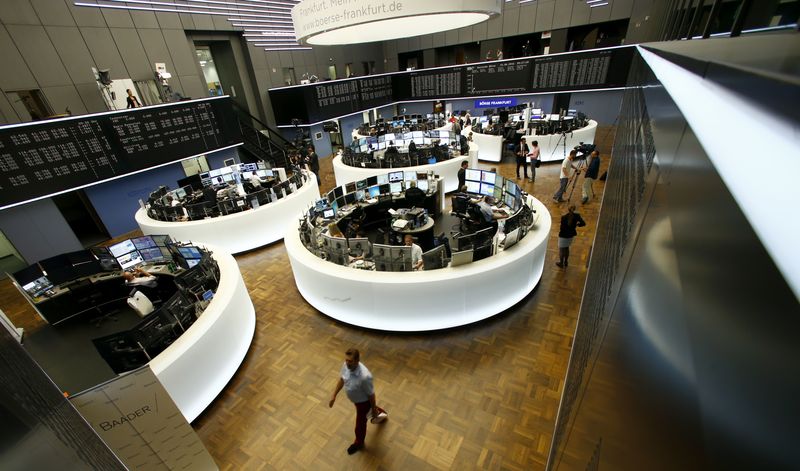By Scott Kanowsky
Investing.com -- European shares slumped and bond yields climbed on Monday, with investors weighing hawkish statements from the Federal Reserve's top policymaker as well as the looming shutdown of a key flow of Russian gas supplies.
The pan-European STOXX 600 dropped by 0.8%, touching a more than one-month low. Germany's DAX also fell by 1.24%, the CAC in France was down by 1.36%, and Italy's FTSE MIB decreased by 0.96% as of 04:07 ET (08:07 GMT). The FTSE 100 in the U.K. was closed for the summer bank holiday.
Meanwhile, the Germany 10-year yield jumped by more than 10 basis points to as much as 1.5460%, setting a fresh two-month high. Its counterpart in Italy rose by a little over 16 basis points to 3.844%, a level last seen in mid-June, while benchmarks in Spain and Portugal also increased. Bond prices typically fall as yields rise.
Weighing on sentiment in Europe were comments from Fed chair Jerome Powell, who last week told a symposium in Jackson Hole, Wyoming, that the central bank has no plans for a dovish change in its rate policy and will continue to raise borrowing costs.
He also warned that U.S. economic growth may be dented by higher rates, saying households and businesses may face "some pain" before soaring consumer prices are corralled.
Powell's comments spurred on bets that the Fed will hike borrowing costs by 75 basis points in September and that rates will end the year well above 3%.
"Powell did what he needed to do last Friday at Jackson Hole, and that was to make it clear that the Fed’s over-riding priority was to get inflation down…not give assurances that they would be gentle with markets, not hint that rates might come quickly down once they’d peaked," analysts at ING wrote in a note.
The focus now shifts to U.S. payrolls data due out on Friday. A strong labor market report may give the Fed additional room to maintain its current pace of monetary policy tightening.
Elsewhere, concerns remain about the Eurozone's ability to weather a looming energy crisis brought on by unscheduled maintenance of a key gas supply line out of Russia this week. Gazprom (MCX:GAZP), the Moscow-backed energy giant, is expected to stop flows of natural gas to Europe via the crucial Nord Stream 1 pipeline between August 31 and September 2.
The potential shortage pushed German power prices - the European benchmark - above 1,000 euros for the time ever.
These worries also ended the euro's brief foray above dollar parity, with the common currency exchanging hands at $0.9944 in morning European trading. The euro had been lifted late last week on reports that the European Central Bank may also discuss raising its key rates by as much as 75 basis points at its next meeting in September.
In stocks, shares in Ericsson (ST:ERICb) fell after the Swedish telecoms equipment maker said it would move to shutter its business operations in Russia over the coming months. The company initially halted activities in the country in April in the wake of Moscow's invasion of Ukraine.
Shares in French drugmaker Valneva (EPA:VLS) were one of the few risers on Monday, gaining on positive late-stage trial results of its COVID-19 vaccine.
Oil prices added on to gains made last week, as traders judged the potential for a tightening of global supply. U.S. crude futures edged slightly higher by 0.06% to $93.12 a barrel, while the Brent contract rose 0.15% to $99.15.
Additionally, gold futures slipped by 0.95% to $1,733.25.
